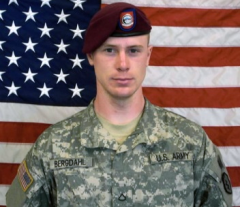
army
A few months ago I wrote about the only American service member (at the time) to be missing in action (MIA) in Iraq. Since then, Staff Sergeant Ahmed Kousay Altaie’s remains have been found and repatriated to the United States, thereby closing a disturbing and emotionally charged chapter of the war in Iraq. Unfortunately, a separate but equally unsettling situation exists in Afghanistan: Army Sergeant Bowe Bergdahl, a member of 1st Battalion, 501st Infantry Regiment from Fort Richardson, Alaska, has been missing in action since his capture by the Taliban-affiliated Haqqani Network on June 30, 2009.
Despite assurances from the Pentagon that the U.S. is doing all it can to find their son, Bergdahl’s parents went public last week with previously secret attempts by the U.S. government to trade their son for Taliban prisoners in U.S. captivity. Frustrated by seemingly stalled efforts to free their son, Bergdahl’s parents decided to publicize the proposed prisoner swap, which involved the Obama administration’s agreement to transfer five high-level Taliban prisoners from Guantanamo Bay to “loose house arrest or supervision” in Qatar.
News of the alleged deal has drawn criticism from both sides of the aisle, as politicians of every ilk balked at the thought of the long-opposed concept of negotiating with terrorists. Mitt Romney, the presumptive Republican presidential nominee, also rejected the proposed transfer: “We do not negotiate with terrorists.”
And yet negotiate with terrorists we do. According to MSNBC, “The transfer was intended as one of a series of confidence-building measures designed to open the door to political talks between the Taliban and Afghan President Hamid Karzai’s government.”
What’s most disturbing here, besides the fact that one of our service members has been missing for nearly three years, is the premise that trading one of ours for several of theirs will improve U.S. and Afghan government relations with the Taliban, a group of hard-line religious zealots that feel compelled to spill Western blood in the name of Allah. What troubles me is the fact that our government, nearly 11 years after we declared war on Al Qaeda and the Taliban, still believes that it can build confidence between a fledgling Afghan government and an unwavering Taliban enemy.
I am torn when I consider this proposed prisoner swap: the father in me says that we should do everything in our power to bring Bowe home; the Marine in me says that we should never negotiate with terrorists, never release prisoners with American blood on their hands, and never make short-term decisions like a prisoner trade that have lasting, unintended consequences (such as encouraging other terrorists to take Americans hostage under the premise of forcing the U.S. government to negotiate their release).
Bowe’s captivity, his three-year separation from family and friends, with only sporadic proof of life, has been a heart-wrenching ordeal. And yet his family suffers in what surely feels like solitude – an indifferent public has all but forgotten about their missing son. So Bowe’s father, Bob, is taking measures into his own hands: he went public about the failed attempt to trade his son for Taliban prisoners; he has openly expressed his dismay at the speed, or lack thereof, of the recovery efforts, stating “There is a dynamic here that has to change;” and finally, he is learning the Pashto language so he can contact the militants directly. All desperate measures taken by a father to secure the release of his son.
Bowe’s parents are hoping for a peaceful resolution, one that does not put other American soldiers in danger: “We don’t want to see Americans killed.” I pray that we can bring Bowe home, and do it with honor and without endangering the lives of more American service members by putting Taliban fighters back in the fight.


